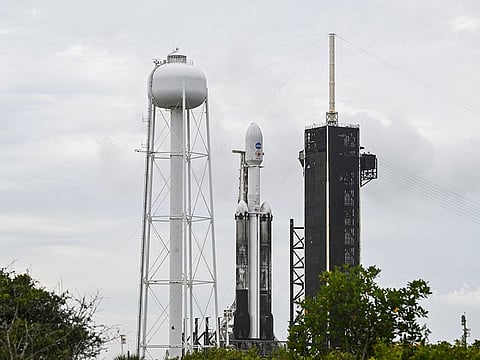Amazon to hire rival SpaceX to launch internet satellites
SpaceX's Starlink already has roughly 5,000 satellites delivering internet service

Amazon.com Inc. has signed a contract with rival SpaceX for three launches of Elon Musk's Falcon 9 rocket, grabbing additional capacity to loft the company's internet-from-space satellites into orbit.
The deal, which Amazon announced on its website Friday, means the e-commerce and cloud-computing giant will be relying in part on its main rival to get its own satellite constellation into orbit. The Falcon 9 launches are set to begin in mid-2025.
SpaceX's Starlink already has roughly 5,000 satellites delivering internet service from low-Earth orbit. Amazon's own Project Kuiper, which is aiming for a similar business model, recently launched the first two test satellites of its planned 3,236-satellite constellation. It aims to start beta testing with corporate customers in the second half of next year.
SpaceX didn't immediately return an emailed request for comment. But in a post on X, the social-media company formerly known as Twitter, Musk wrote: "SpaceX launches competitor satellite systems without favor to its own satellites. Fair and square."
Amazon had previously hoped to have its first satellites aloft as early as the fourth quarter of 2022 before a series of testing failures and other issues with its launch partners delayed flights.
Amazon in 2022 announced a deal with three launch providers, the United Launch Alliance, Amazon founder Jeff Bezos' Blue Origin LLC, and Arianespace, for at least 68 launches (and possibly as many as 83) of the companies' rockets to get the bulk of the Project Kuiper constellation into orbit. That deal relies on newly developed rockets which have yet to fly to space and have suffered from numerous delays.
In a separate deal, ULA's older, flight-proven Atlas V rocket took Amazon's first two satellites to orbit in October. The company has eight remaining launches with the rocket, which has been transitioning out of service.
Earlier this year, a pension fund sued Bezos, members of Amazon's board and the company itself, alleging that Amazon had failed to consider using reliable SpaceX rockets for Kuiper launches in part because of the rivalry between Bezos and Musk.
That choice led to more expensive rocket launches and delays in the project as Blue Origin and other launch partners faced unexpected technical challenges with the spacecraft Amazon was relying on, according to the complaint by the Cleveland Bakers and Teamsters Fund. The company said at the time that the claims were without merit.






